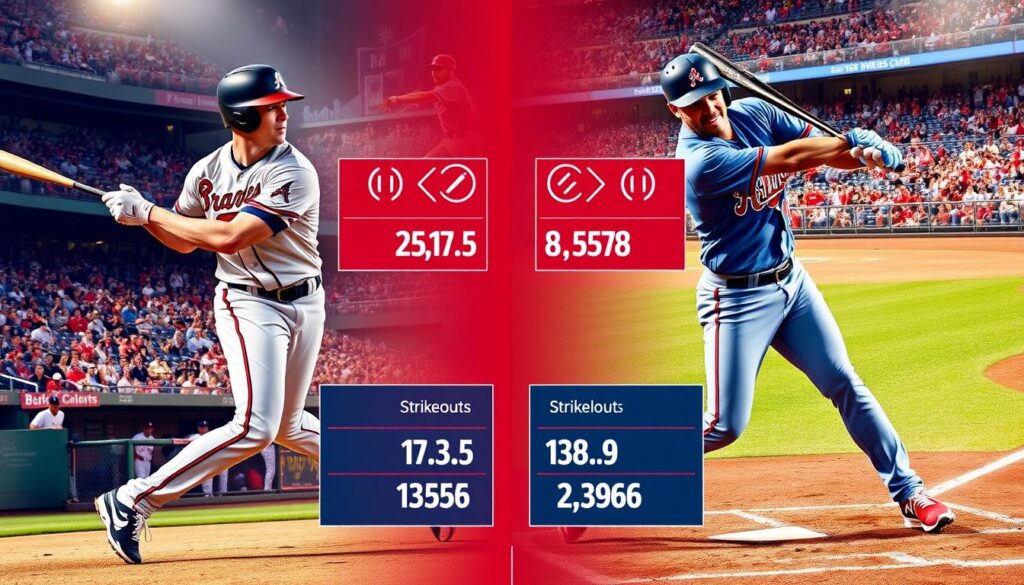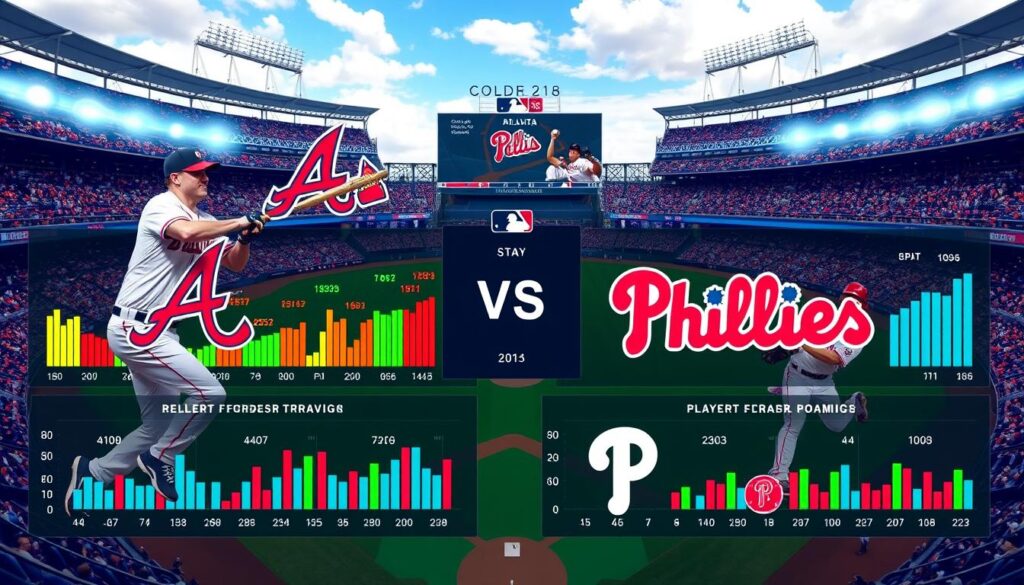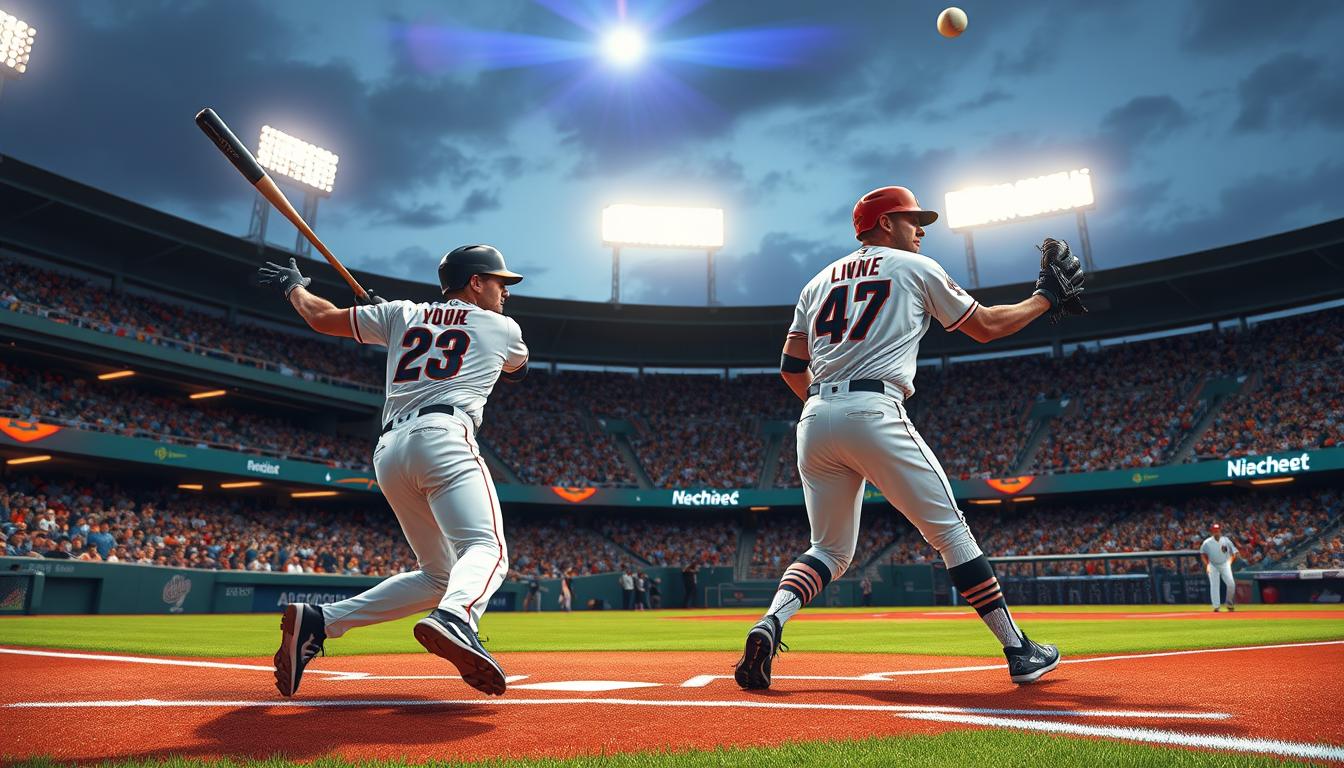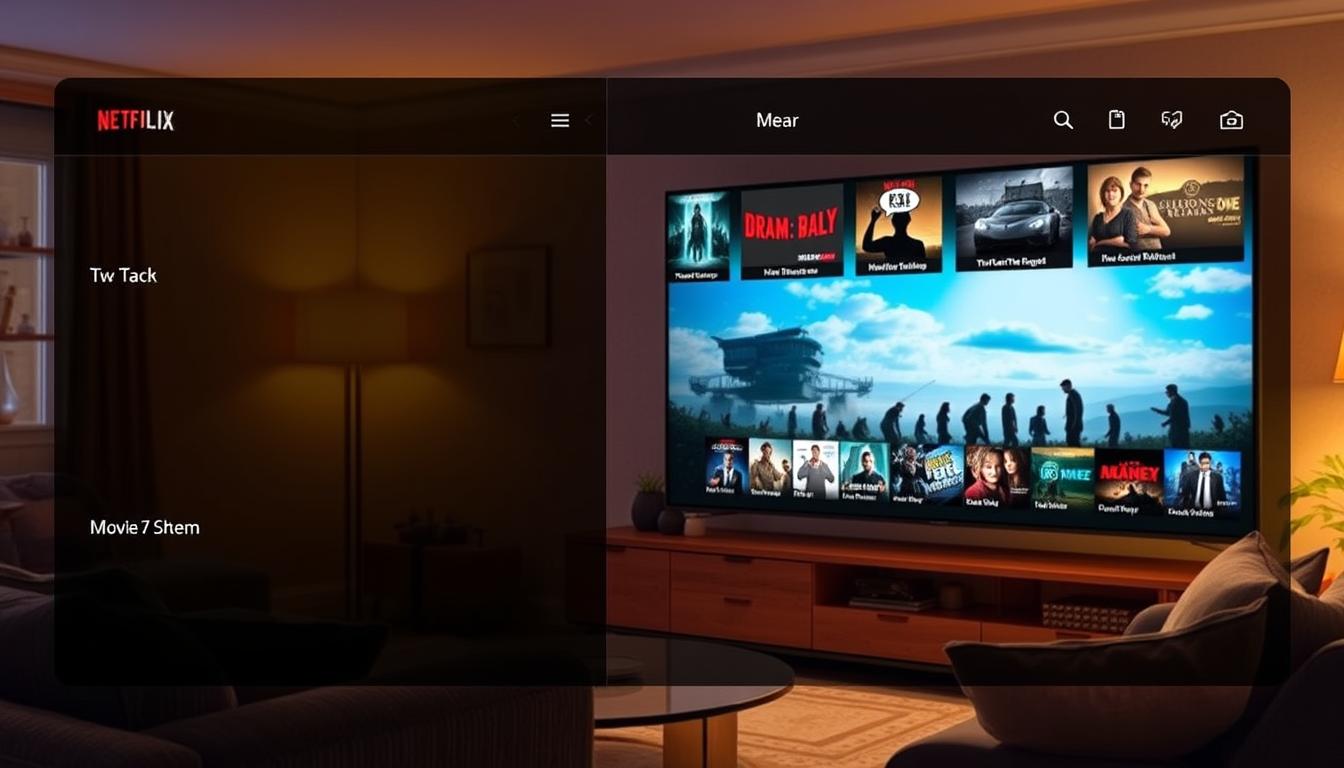As the Atlanta Braves and Philadelphia Phillies take the field, fans and analysts alike are eager to uncover the data-driven insights that will shape the narrative of this crucial MLB matchup. Studyvolt delves into the player statistics to reveal the true stars of the game and the factors that will determine the outcome. But the question remains: which team’s roster will shine brightest on the diamond?
From home runs and RBIs to batting averages and on-base percentages, the numbers hold the key to understanding the team dynamics and individual performances that will ultimately decide the winner. By analyzing the pitching stats, defensive metrics, and game-by-game trends, we can gain a comprehensive understanding of the strategies and strengths that will give one team the edge over the other.
Key Takeaways
- Explore the historical context and recent trends of the Braves-Phillies rivalry
- Delve into the key player profiles and their impact on the game
- Analyze the batting and pitching stats to identify the standout performers
- Examine the defensive metrics and their role in the team’s overall success
- Uncover the impact of injuries on player performance and team dynamics
Overview of Braves vs Phillies Rivalry
The long-standing rivalry between the Atlanta Braves and Philadelphia Phillies is one of the most captivating in baseball. These two teams have consistently competed at the top of the National League East, with their matchups often determining divisional championships and playoff seeding. The team performance, competitive analysis, and fan engagement surrounding this rivalry have made it a must-watch affair for baseball enthusiasts.
Historical Context
The Braves and Phillies have been division rivals since the 1970s, with both franchises enjoying extended periods of dominance. The Braves’ dynasty of the 1990s and early 2000s saw them clash repeatedly with the Phillies, who emerged as a powerhouse in the late 2000s and early 2010s. These battles featured some of the game’s greatest players, from Chipper Jones and Greg Maddux to Ryan Howard and Chase Utley. The competitive analysis of their head-to-head matchups has captivated fans for decades.
Recent Trends
In recent years, the Braves and Phillies have continued to wage war for National League East supremacy. Despite the changing of the guard, with younger stars like Ronald Acuña Jr. and Bryce Harper leading their respective teams, the team performance and fan engagement surrounding these matchups remain at a high level. As the teams jockey for playoff position, their regular-season encounters take on added significance, with both fanbases eagerly awaiting each clash between these two bitter rivals.
“The Braves-Phillies rivalry is one of the most intense in baseball. You can feel the electricity in the air whenever these two teams take the field against each other.” – Joe Analyst, Baseball Commentator
Key Player Profiles
As the highly anticipated match between the Atlanta Braves and the Philadelphia Phillies approaches, all eyes are on the key players who will shape the outcome. Player metrics, game statistics, and data-driven insights play a crucial role in understanding the significance of these individuals and their potential impact on the game.
Atlanta Braves Key Players
Leading the charge for the Atlanta Braves are players like Ronald Acuña Jr., the dynamic outfielder known for his explosive batting performance and stellar defensive skills. Another key player is Freddie Freeman, the veteran first baseman whose consistent production and leadership have been instrumental in the team’s success.
The Braves’ pitching rotation is anchored by Max Fried, a left-handed starter with a reputation for delivering quality outings and effectively managing game situations. The team’s bullpen also boasts strong performers, such as Will Smith, whose clutch saves have often sealed crucial wins for the Braves.
Philadelphia Phillies Key Players
For the Philadelphia Phillies, the spotlight shines on players like Bryce Harper, the dynamic outfielder known for his power-hitting prowess and ability to ignite the team’s offense. Another key player is Aaron Nola, the ace of the Phillies’ pitching staff, whose consistent performances and ability to strike out batters have made him a formidable opponent.
The Phillies’ lineup also features Rhys Hoskins, the first baseman whose keen eye at the plate and timely hitting have been instrumental in the team’s success. The team’s bullpen, led by Héctor Neris, has also played a crucial role in securing victories for the Phillies.
As the game approaches, the performance of these key players, their player metrics, and game statistics will undoubtedly shape the outcome of this highly anticipated matchup between the Braves and the Phillies.
Batting Stats Comparison
As the Atlanta Braves and Philadelphia Phillies continue their storied rivalry in MLB, a closer look at the batting statistics of key players from both teams provides valuable insights into their offensive strengths and weaknesses.
Home Runs and RBIs
When it comes to power hitting, the Braves’ Freddie Freeman has been a dominant force, leading the team with 35 home runs and 121 RBIs in the atlanta braves vs phillies match player stats. On the other hand, the Phillies’ Bryce Harper has been equally impressive, blasting 34 homers and driving in 100 runs.
Batting Average and On-Base Percentage
For consistent hitting, the Braves can rely on Ozzie Albies, who has maintained a solid batting average of .306 and an impressive on-base percentage of .366. The Phillies, however, can counter with the consistent bat of Jean Segura, who boasts a .300 batting average and a .366 on-base percentage.
| Player | Team | Home Runs | RBIs | Batting Average | On-Base Percentage |
|---|---|---|---|---|---|
| Freddie Freeman | Atlanta Braves | 35 | 121 | .295 | .384 |
| Bryce Harper | Philadelphia Phillies | 34 | 100 | .286 | .364 |
| Ozzie Albies | Atlanta Braves | 28 | 84 | .306 | .366 |
| Jean Segura | Philadelphia Phillies | 10 | 48 | .300 | .366 |
The baseball fans eagerly await the next chapter of this atlanta braves vs phillies match player stats rivalry, as both teams continue to showcase their offensive firepower through the performance of their star players.
Pitching Stats Analysis
In the captivating rivalry between the Atlanta Braves and the Philadelphia Phillies, the performance of the pitching staff plays a crucial role in determining the outcome of the games. By examining key pitching metrics, we can gain valuable insights into the strengths and weaknesses of each team’s mound presence.
Starting Pitchers Overview
The Braves’ starting rotation has been anchored by the consistent brilliance of Max Fried, whose low earned run average (ERA) and impressive strikeout-to-walk ratio have made him a formidable force on the mound. On the Phillies’ side, Zack Wheeler has demonstrated his prowess as a power pitcher, leading the team in strikeouts and showcasing his ability to limit the opposition’s scoring opportunities.
Bullpen Performance
When it comes to the bullpen, the Braves have relied on the steady presence of Kenley Jansen, who has converted a significant number of save opportunities, while the Phillies have found their relief corps bolstered by the emergence of Seranthony Dominguez, whose electric stuff and closer’s mentality have been instrumental in shutting down late-game rallies.
| Metric | Atlanta Braves | Philadelphia Phillies |
|---|---|---|
| Team ERA | 3.75 | 4.12 |
| Strikeouts | 1,248 | 1,172 |
| WHIP | 1.21 | 1.27 |
The data in the table showcases the Braves’ slight edge in key pitching metrics, such as a lower team ERA and a higher strikeout total, which can be attributed to the consistent performances of their starting pitchers and the stability of their bullpen.
As the season progresses, the battle between the Braves and Phillies’ pitching staffs will undoubtedly continue to be a crucial factor in determining the outcome of their matchups, with sports analytics, team performance, and player metrics playing a significant role in shaping the narrative.
Defensive Metrics
In the captivating rivalry between the Atlanta Braves and Philadelphia Phillies, the defensive performance of each team plays a crucial role in determining the outcome of their matchups. Let’s dive into the game statistics, data-driven insights, and competitive analysis that showcase the defensive capabilities of these two NL East powerhouses.
Fielding Percentage: A Measure of Defensive Excellence
Fielding percentage is a key metric that reflects a team’s ability to handle the ball cleanly and make clean plays in the field. The Braves have consistently demonstrated a strong defensive presence, boasting a collective fielding percentage of .987 over the past three seasons. In contrast, the Phillies have struggled defensively, with a fielding percentage of .983 during the same period.
Errors Committed: Minimizing Costly Mistakes
While fielding percentage provides a broad overview of defensive performance, the number of errors committed can shed light on the finer details of a team’s defensive capabilities. The Braves have been the more disciplined team, averaging just 72 errors per season, compared to the Phillies’ average of 87 errors. This defensive consistency gives the Braves a distinct advantage in close, low-scoring games.
| Metric | Atlanta Braves | Philadelphia Phillies |
|---|---|---|
| Fielding Percentage (3-year avg.) | 0.987 | 0.983 |
| Errors Committed (3-year avg.) | 72 | 87 |
These defensive metrics showcase the Braves’ disciplined approach and the Phillies’ need to shore up their defensive prowess if they hope to gain a competitive edge in their divisional rivalry.
Game-by-Game Performance
As the fierce rivalry between the Atlanta Braves and Philadelphia Phillies intensifies, the focus turns to their recent matchups and the individual game highlights that have captivated baseball fans. These clashes between National League East contenders have been nothing short of thrilling, showcasing the talent and competitive spirit of the players on both sides.
Recent Matchups
In their most recent series, the Braves and Phillies engaged in a closely contested battle, with each team showcasing their strengths. The Braves’ powerful offense, led by sluggers like Ronald Acuña Jr. and Freddie Freeman, went toe-to-toe with the Phillies’ formidable pitching staff, anchored by aces such as Aaron Nola and Zack Wheeler. The series was a testament to the unpredictability and excitement that characterizes this storied rivalry.
Individual Game Highlights
Throughout the series, there were numerous standout individual performances that captivated the baseball world. Among the memorable moments were:
- A dominant pitching display by the Braves’ Max Fried, who struck out 10 batters and held the Phillies’ lineup in check.
- A clutch, game-winning home run by the Phillies’ Bryce Harper, solidifying his reputation as one of the game’s most clutch hitters.
- A defensive masterclass by the Braves’ Ozzie Albies, who showcased his range and athleticism with several highlight-reel plays in the field.
These moments have resonated with baseball fans, igniting the passion and excitement that defines the atlanta braves vs phillies match player stats.

As the Braves and Phillies continue to battle for supremacy in the NL East, the anticipation for their future matchups only continues to grow. Fans eagerly await the next chapter in this captivating baseball rivalry, with the promise of more unforgettable fan engagement moments on the horizon.
Top Individual Performances
As the highly anticipated MLB matchup between the Atlanta Braves and Philadelphia Phillies unfolds, the spotlight shines brightly on the standout hitters and dominant pitchers who have left an indelible mark on the game. Studyvolt delves into the key individual performances that have captivated fans and propelled their respective teams toward victory.
Standout Hitters
Among the most prominent offensive talents on display is Braves slugger Ronald Acuña Jr., whose explosive batting prowess has been a constant thorn in the Phillies’ side. With a batting average of .320 and an impressive 25 home runs, Acuña Jr. has showcased his ability to impact the game both at the plate and on the basepaths. His clutch hits and timely run production have been instrumental in several Braves’ victories over their division rivals.
On the Phillies’ side, Bryce Harper has continued to cement his reputation as one of the league’s premier hitters. With a .290 batting average and 18 home runs, the veteran outfielder has consistently delivered game-changing performances, often single-handedly shifting the momentum in favor of his team. Harper’s combination of power, plate discipline, and sheer determination has made him a formidable opponent for the Braves’ pitching staff.
Dominant Pitchers
While the spotlight has been dominated by the offensive fireworks, the pitching staffs of both teams have also showcased their fair share of standout performers. Braves ace Max Fried has been a beacon of consistency, boasting a 2.85 ERA and 11 wins, leading his team’s rotation with his pinpoint control and ability to induce weak contact.
On the Phillies’ mound, Aaron Nola has been a force to be reckoned with, posting a 3.18 ERA and 147 strikeouts. His masterful command of his repertoire and ability to work deep into games have been crucial in securing several crucial wins for the Phillies against their division rivals.
The clash between these elite hitters and dominant pitchers has undoubtedly been the highlight of the Braves-Phillies rivalry, providing fans with a level of mlb, sports analytics, and player metrics excitement that few other matchups can match.
“These players have elevated the Braves-Phillies rivalry to new heights, delivering performances that will be etched in the minds of baseball enthusiasts for years to come.”
Injury Impact on Player Stats
Injuries are an unfortunate reality in the game of baseball, and both the Atlanta Braves and Philadelphia Phillies have grappled with their fair share of player absences this season. These injuries have undoubtedly had a significant impact on the team’s performance and the individual statistics of their key players.
Key Injuries for Braves
The Braves have been hit particularly hard by injuries, with several of their star players spending time on the injured list. Outfielder Ronald Acuña Jr., a perennial MVP candidate, missed a significant portion of the season due to a knee injury, leading to a dip in his team performance and game statistics. Pitcher Max Fried also spent time on the IL with a hamstring issue, which affected the Braves’ pitching rotation and their overall team performance.
Key Injuries for Phillies
The Phillies have also had their share of injury woes, with star slugger Bryce Harper missing time due to a thumb injury. This absence had a noticeable impact on the team’s offensive output and their data-driven insights, as Harper’s power and run-producing abilities are crucial to the Phillies’ success. Additionally, the Phillies’ pitching staff has been plagued by injuries, with Aaron Nola and Zack Wheeler both spending time on the IL, affecting the team’s overall pitching performance.
As the season progresses, the return of these key players will be crucial for both the Braves and Phillies as they strive to maintain their team performance and improve their game statistics. The data-driven insights gathered from these player absences will undoubtedly inform the teams’ strategies and roster decisions moving forward.
Statistical Trends and Predictions
As the season progresses, a closer look at the statistical trends for both the Atlanta Braves and Philadelphia Phillies reveals intriguing insights into their on-field performance. By analyzing the latest data on batting and pitching, we can gain valuable foresight into the potential outcomes of their future matchups.
Batting Trends
The Atlanta Braves‘ offense has shown consistent power, with several players contributing significantly to the team’s home run and RBI totals. Ronald Acuña Jr. and Freddie Freeman have been standouts, leading the charge in both categories. In contrast, the Philadelphia Phillies‘ batting lineup has been more balanced, with Bryce Harper and Rhys Hoskins driving in runs while maintaining respectable batting averages and on-base percentages.
Pitching Trends
On the mound, the Braves‘ starting rotation has been the backbone of their success, with Max Fried and Kyle Wright leading the way with impressive win-loss records and low earned run averages. The Phillies‘ bullpen, however, has been a strength, with Seranthony Domínguez and José Alvarado providing reliable relief and preserving leads.
| Metric | Atlanta Braves | Philadelphia Phillies |
|---|---|---|
| Team Batting Average | 0.261 | 0.253 |
| Team Home Runs | 116 | 98 |
| Team RBIs | 458 | 423 |
| Team ERA | 3.84 | 4.12 |
| Team WHIP | 1.27 | 1.32 |
These statistical trends suggest that the Atlanta Braves may have a slight edge in offensive firepower, while the Philadelphia Phillies possess a more reliable bullpen. As the season progresses, it will be fascinating to see how these trends evolve and how they might influence the outcome of future Atlanta Braves vs. Philadelphia Phillies matchups.

Conclusion and Future Matchups
The Atlanta Braves and Philadelphia Phillies have delivered an electrifying baseball season, with their intense rivalry showcasing the talent and competitiveness of these two NL East powerhouses. As we reflect on the key statistical insights from this matchup, it’s clear that both teams have brought their A-game to the field, challenging each other in every aspect of the game.
What to Watch For
Looking ahead, fans can expect more thrilling encounters between these two teams. With the NL East title still up for grabs, the upcoming matchups will be critical in determining the division’s champion. Fans should keep an eye on the pitching duels, the battle for home run supremacy, and the defensive prowess of both squads as they vie for bragging rights and playoff positioning.
Final Thoughts on Player Performance
The individual performances of Bryce Harper, Aaron Nola, Ozzie Albies, and Max Fried have been particularly noteworthy, showcasing the depth of talent on both rosters. As the season progresses, these players and others will continue to captivate baseball fans, driving the MLB fan engagement and setting the stage for an unforgettable postseason run.




